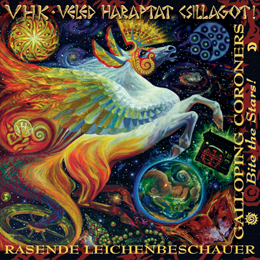
It's been 13 years since Hungarian shamanistic Punk legend VHK released their previous album, and therefore it should not be a surprise that most younger music lovers haven't heard about this band yet! I mean, it was even a first for myself, and when the band was founded in 1975, I was about to turn 14!
Of course, the first years of the band were rather obscure, with authorities interrupting the band's first 8 concerts, and then banishing 'em for 11 years. If you're wondering why, just imagine the potential dangers of a shamanistic Punk band for those at power in Hungary during the late '70s and early '80s. You see, VHK had discovered a rather new way of music creation, which consisted of using a base of previously rehearsed music for an on-stage improvisation through a release of the deepest musical creative powers. Shamanistic music containing, after all, a certain hypnotic effect, the powers that be were obviously afraid for the un-restrained liberation of the souls of their subjects. After all, back then “normal” people had a lot to grumble about, being kept on the leash as they were by the Communist government and its secret police forces.
Although banished from playing as a band, members of the band nevertheless were continuously active, pushed into action by audiences of other bands (and without declaring themselves as a band)...or simply playing under pseudonyms as guest musicians in befriended bands. Meanwhile, the band won a price at an experimental film festival in 1981, and the video was shown several times on German television, making for a cult following in that country outside the band's home turf. From 1984, DHK finds ways to play in “The West” on a regular basis, finding such illustrious people as Queen Beatrix of Holland and Austria's then chancellor Fred Sinowitz intervening with Hungarian Ministry Of Culture (respectively in 1986 and 1987) to allow the band to come and play abroad. By then (the late '80s), music of DHK had already seeped out of its country of origin, and pretty soon the Hungarian band was making friends and followers among the likes of Einstrürzende Neubauten, Henry Rollins, Jello Biafra, and Billy Idol...and in 1992, the band's album Hammering On The Gates Of Nothingness (translated title, of course) gained a #2 position on the Top-100 list of a Belgian radio station! Around that time, several American managers were also suggesting the band to come tour the USA.
For a while there, everything was sunshine in the lives of the Hungarians. American cult label Alternative Tentacles released several albums of the band during the '90s (including 1988's Teach Death A Lesson, 1990's Jump Out The World-Instinct and 1992's Hammering On The Streets Of Nothingness), and further albums during the last decade of the previous millennium were 1994's Giant Space (a live album), 1997's Reconquering Eden - 1st Attack, 1998's Reconquering Eden - 2nd Attack, and 1999's Dancing With The Sun. The band's first manager, Dietmar Lupfer, eventually took the band to New York for the 1990 New Music Seminar and later to Germany's Pop Komm!, getting rave reviews from leading music magazines for their performances. During their '95 appearance at the Steirischer Herbst festival, the band goes onto stage with a complement of Les Tambours Du Bronx, making for a set-up of 27 people on the same stage. In 1996, DHK played in front of an audience exceeding 40,000 people at the Student Island akà Diáksziget festival.
In spite of their successes, the band split in 2001, reforming as Vágtázó Életerö (= Galloping Life Force) in 2008, and playing their first show after reformation on April 26, 2009! The new name had been decided to because on the one end, the original drummer had not been part of the reunion, and on the other hand they felt the new name a better fit for what they stood for as a band. Strangely enough, when the band eventually released this comeback album in 2012, it was under their original name Vágtázó Helottkémek, and have since performed again as VHK.
To describe VHK's music on this album is heavy task to say the least...but I'll try! First of all, it's necessary to understand that all vocals are done in the Hungarian language, with the lead singer wailing through his lyrics. He's aided by at least two backing singers, the first bringing a wordless drone bass, the second adding wordless and almost nonsensical utterings. The musical accompanying this can vary (in electrical magnification as well as distortion), but generally has a rather repetitive feel (with nevertheless underlaying variations on themes). While some songs will be closer to a more organic and acoustic kind of music (expect a flute to come add to the fray, as in the album's opening track) and are therefore shamanistic in a purer sense, with a complexity which will certainly the more progressive minded music lovers...the songs with the more electrified music will probably please the more organized mind a little more.
Ach...you know something? Going through the album would take me too long, and after all...you can listen to the complete album anyway! Just enter “veled haraptat csillagot” in your google browser, and you'll find a link to the album's SoundCloud page. Song titles there are in Hungarian, as opposed to on the Finnish version of the album (where they come in the English translation). Anyway...enjoy! Hum...the only remaining problem I have now, is the question whether to classify the album in my 2012 or 2013 year-lists!
